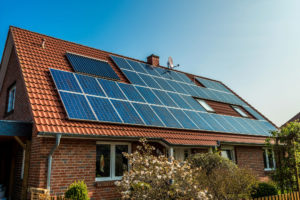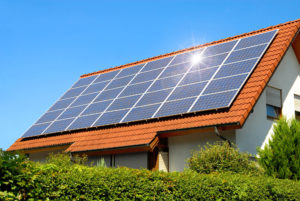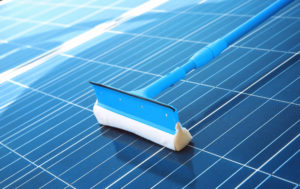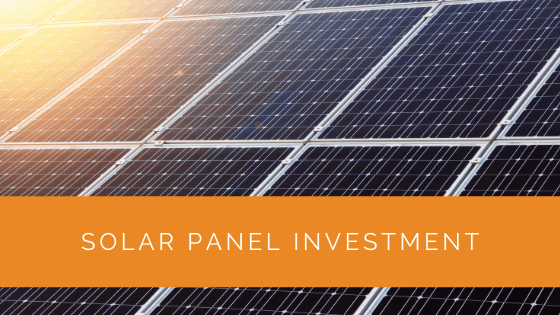Green energy has become one of the hottest investment opportunities in today’s world. This is because people across the globe are becoming more and more aware of the consequences of climate change. Reducing your carbon footprint is one of the best ways to mitigate climate change.
Solar energy is a popular green and clean energy that people can introduce to their homes. However, the primary investment into making homes completely solar-powered can throw people off. You will need to invest in solar panels in the form of their initial installation and maintenance.
You may need some guidance if you are considering solar panels for your house. Here’s everything you need to know about solar electricity and why it is worth investing in solar PV panels.
Contents
- 1 Key Takeaways
- 2 What Is Solar Energy?
- 3 Renewable Energy Sources
- 4 How Do Solar Panels Work?
- 5 How Much Do Solar Panels Cost?
- 6 Advantages and Disadvantages of Solar Power
- 7 How Much Electricity Does a Solar Panel System Produce?
- 8 Things to Do Before Buying a Solar Panel
- 9 How to Look After Solar Panels?
- 10 Case Study: Maximising Returns from Solar Panel Investment
- 11 Expert Insights From Our Solar Panel Installers About Solar Panel Investment
- 12 Discover the Power of Solar with Solar Panels Network
- 13 To Conclude With
Key Takeaways
- Solar energy is a renewable and environmentally friendly energy source obtained from the sun, and investing in solar panels can significantly reduce electricity bills and carbon footprint.
- The cost of solar panels varies depending on the type and size, but they offer long-term benefits such as cheaper electricity, reliability, and property value increase.
- Solar panels generate electricity during the day, with excess energy stored for nighttime use or fed back into the grid, potentially providing financial incentives through feed-in tariffs and the smart export guarantee.
What Is Solar Energy?
Solar energy is a form of green renewable energy obtained from the sun. We get solar energy in the form of heat and light as the radiations from the sun travel across space and into our atmosphere. This energy source can provide us with surplus electricity for the foreseeable future.
While the energy obtained from the sun is not usable, we can convert it using solar panels. Solar PV panels have photovoltaic cells on their surface that convert solar energy into electrical energy.
If you install enough solar panels, the electricity generated could power your house through the day and the night. This way, you can save much money on your electricity bills.
Renewable Energy Sources
The sun is a source of energy for everyone on earth. Solar energy is considered a renewable energy source because it does not diminish. We cannot virtually run out of the power the sun gives, so we must make the most of this endless energy source.
Solar PV systems are much more lucrative than electricity from the national grid. It is also a much better option than burning fossil fuels when it comes to being more environmentally conscious. You can install a solar panel system in your home and see the difference in your electricity bills.
The initial investment in a solar PV system is worth it, as you will be generating your energy for the next couple of decades. This energy-efficient solution saves electricity bills and reduces your carbon footprint.

How Do Solar Panels Work?
Solar panels have a very straightforward mechanism. These panels are used for generating energy in homes. They use solar power to convert DC electricity into an alternate current and supply it to all the appliances in your house.
The photovoltaic cells present on the surface of your solar panels absorb sunlight and its photons first. These photons undergo reactions because of the chemicals present in the inner layers of the solar PV panel.
Once these photons are converted into electrons, the electricity generated is stored in solar batteries. These batteries also store excess electricity, which is not used during the day. The PV system could either keep it for later or send the energy generated back to the grid.
How Much Do Solar Panels Cost?
The cost of installing solar panels depends on the types of solar panels you are interested in. Many options are available, but you need to do your due diligence on the models before investing.
Your total investment depends on the size of the solar panel you want. In the UK, the average cost of a solar system is around £5,940. This amount is estimated for a family of three that may require a 3 to 5-kilowatt-hour solar PV system.
A system that size consists of about 13 solar panels. These panels are generally installed on roofs and require a total space of 20m². However, you can install these solar panels anywhere on your property if they access direct sunlight.
There are three different types of solar panels worth installing in your home. These include:
- Monocrystalline panels
- Polycrystalline panels
- Thin-film solar panels
All three varieties have their benefits, and it is essential to research them before installing them in your homes.
Advantages and Disadvantages of Solar Power
Solar energy is undoubtedly great for the environment but has many other benefits. People must know exactly what they are investing in and what the help of this investment is. Here is what you can expect from your solar PV systems.
- They provide you with cheaper electricity for your house.
- They are incredibly reliable and even work on cloudy days.
- They have an excellent and quick return on investment.
- They require minimum maintenance and last you decades.
- They are an excellent choice for people who want to increase their property value.
- Solar panels protect the environment by reducing your carbon footprint.
Solar power has many unique benefits. However, there are a few downsides to this, too. The following are the disadvantages of investing in solar panels.
- Solar panels installed can be affected by the United Kingdom’s weather conditions.
- You will need a south-facing flat roof to install solar panels.
- Your house and property may not be compatible with solar panel installations.
- Your solar PV system might cost you a fortune as an initial investment.
You must weigh your options and see which type of solar panel is perfect for your property. It would be best if you also decided whether or not it is a good idea for you. Moreover, renewable technologies are fast evolving and providing affordable alternatives for every household and budget.
How Much Electricity Does a Solar Panel System Produce?
Solar panels can produce copious amounts of electricity depending on the size of your setup. Solar power is abundant during the daytime, giving you unlimited energy. All you need to do is strategically install your solar panels and generate more electricity than ever.
On average, solar panel owners can expect their panels to generate anywhere between 250 to 400 watts per hour. This means a solar PV system can generate about 3 kilowatts daily. Most families can comfortably use this electricity throughout the day.
Additionally, many people find that the solar system usually generates more electricity than required. This excess energy is first stored in the solar battery, and you can use this stored electricity during the night.
However, you can cash in if the usable electricity is still left over after everything. A feed-in tariff is the fixed amount given to people for generating electricity and giving the excess to the grid. The energy market is thriving because of incentives like a feed-in tariff. This way you can get even more money apart from saving on your electricity costs. While some solar panels require a hefty initial investment, there are multiple ways to get your money’s worth with these panels.
The SEG or smart export guarantee is another excellent way to make money from solar PV systems. This scheme allows small-scale electricity generators to get money for producing electricity. You can apply for the smart export guarantee payment and cash in!

Things to Do Before Buying a Solar Panel
Before buying a solar panel, you need to prepare your house and ensure you have all the prerequisites covered. These are a few things that can help make your investment successful.
Hire the Right Installers
One of the biggest mistakes you can make is hiring someone incompetent for your installation. Even if you think you know everything about installing solar panels, you need experienced professionals.
Additionally, installers often provide their clients with excellent advice. You will need this expert guidance if you know nothing about panels.
Choose the Right Solar Inverter
Solar inverters are a crucial part of your solar system. These inverters convert DC into an alternate current so you can use it in your home. You must pick the right inverter to be compatible with your solar panel system.
Find Solar Modules that Are Compatible
Solar panels come in different sizes and have different properties. It would help if you found a model that works best for you. It would be best to consider the climatic conditions and the energy bills you get from your supplier.
Prepare Your Roof for Installation
You need to clear out the clutter from your roof, if any, and make room for your solar panel. Make sure that the roof is south-facing and has an adequate slant. You will also need to arrange wiring and securing all the equipment on the top.
How to Look After Solar Panels?
You can do a few things to ensure your solar panels last a long time and get your money’s worth. These tips can help you extend your system’s lifespan by years and even save you a lot of money in the long run.
Keep Them Clean
Keep the solar panel clean by removing any dust or debris from its surface. If the solar panel is covered with debris, its output will be negatively affected. Dirty solar panels produce less electricity and are not as efficient.

Try to Keep Them Away from The Shade
Shading can reduce your panel’s output, too. You need to keep it away from trees and other obstructions. Position it so that it has access to direct sunlight immediately once the sun rises. It is essential to place it at an angle to absorb the maximum amount of the sun.
Avoid Waterlogging
While solar panels are water-resistant and can withstand rain, you might want to keep them away from saturated areas. If your roof accumulates water in the monsoon, you must figure out a way to drain this water immediately.
Solar panels cannot function optimally when they are partially submerged in water. This water can also seep through their outer covering and into the wirings. This could damage your panel system and cost you a fortune.
Perform Frequent Checks
The best way to prevent damage is to monitor your panel. Perform regular tests and examine the system occasionally so you can nip any problem in the bud.
Case Study: Maximising Returns from Solar Panel Investment
Background
Solar Panels Network was approached by a family in the Midlands looking to reduce their carbon footprint and lower their rising electricity bills. The family was particularly interested in the long-term financial benefits of solar energy and wanted to explore the best options for their home, which had a south-facing roof ideal for solar panel installation.
Project Overview
The project involved installing a high-efficiency solar panel system designed to meet the family’s daily energy needs. We recommended a 4 kW solar PV system using monocrystalline panels, known for their high efficiency and excellent performance in limited roof space. The goal was to achieve significant energy savings, a quick return on investment, and a reduction in carbon emissions.
Implementation
- Site Assessment: Conducted a thorough site survey to assess the roof’s suitability, including orientation, shading, and structural integrity.
- System Design:
- Chose high-efficiency monocrystalline panels for optimal energy generation.
- Included a solar inverter compatible with the panels and future battery storage options.
- Installation:
- Installed 16 solar panels on the south-facing roof, ensuring they were angled for maximum sun exposure.
- Connected the system to the home’s electrical grid with a smart meter for precise monitoring and participation in the Smart Export Guarantee (SEG) scheme.
- Testing and Commissioning: Verified system performance and ensured it met the expected output levels.
Results
- Energy Savings: The system generated approximately 4,200 kWh annually, covering over 75% of the family’s electricity needs.
- Financial Benefits: The family saved around £600 per year on electricity bills and earned additional income through the SEG scheme by exporting excess energy to the grid.
- Environmental Impact: The installation reduced the household’s carbon emissions by nearly 2.5 tonnes per year, contributing positively to environmental conservation.
- Payback Period: The investment is projected to pay for itself within 6-7 years, after which the family will benefit from virtually free electricity for the system’s lifetime.
Summary
This case study demonstrates the substantial financial and environmental benefits of investing in solar panels. By choosing high-efficiency monocrystalline panels and leveraging the SEG scheme, the family achieved significant cost savings and a quick return on investment. The project highlights the importance of expert installation and strategic planning to maximise the benefits of solar energy. At Solar Panels Network, we are committed to providing tailored renewable energy solutions, helping homeowners transition to greener alternatives and secure long-term savings. This project underscores the viability and profitability of solar panel investment in today’s energy market.
Expert Insights From Our Solar Panel Installers About Solar Panel Investment
Investing in solar panels is not just about saving on electricity bills; it’s about securing a sustainable energy future for your home. The technology has advanced significantly, making solar panels more efficient and affordable. With the right setup, homeowners can expect a payback period of just a few years, followed by decades of free, clean energy.
Senior Solar Energy Consultant
Choosing the right type of solar panel, whether monocrystalline, polycrystalline, or thin-film, depends on your specific energy needs and roof space. Monocrystalline panels, for example, offer higher efficiency and are great for limited spaces. It’s crucial to consider the long-term benefits, including potential property value increases and the environmental impact.
Solar Installation Manager
Proper installation and regular maintenance are key to maximising the lifespan and efficiency of your solar panel system. A well-maintained system can last over 25 years, providing consistent energy output and significant savings. It’s not just an investment in technology; it’s an investment in peace of mind knowing that you’re contributing to a greener planet.
Renewable Energy Specialist
Discover the Power of Solar with Solar Panels Network
Are you navigating the world of solar installations? Look no further than Solar Panels Network, the UK’s trusted partner in harnessing the sun’s potential. Our dedication goes beyond just installations; we’re on a mission to transform how homeowners and businesses across the UK perceive and utilise energy. By choosing us, you’re reducing your carbon footprint and making a smart financial move that promises savings for years ahead. Contact us today and embark on your solar journey.
To Conclude With
Solar panels are an excellent investment for people who want to save money while consciously doing something about the environment. With just a little initial investment, you can generate electricity and save money for the rest of your life!
About the Author
Solar Panels Network stands at the forefront of solar energy solutions, driven by a team of seasoned solar engineers and energy consultants. With over decades of experience in delivering high-quality solar installations and maintenance, we are committed to promoting sustainable energy through customer-centric, tailored solutions. Our articles reflect this commitment, crafted collaboratively by experts to provide accurate, up-to-date insights into solar technology, ensuring our readers are well-informed and empowered in their solar energy decisions.

